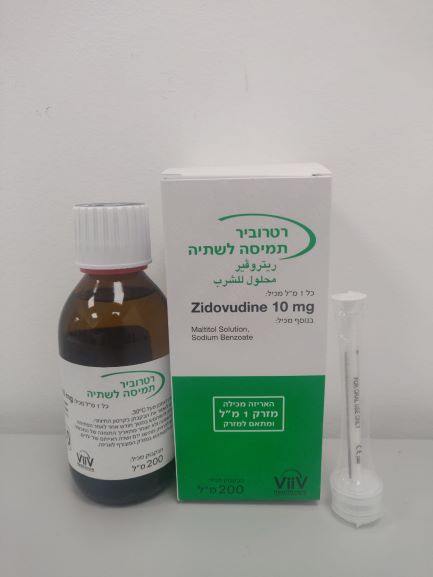Quest for the right Drug

רטרוביר תמיסה לשתיה RETROVIR ORAL SOLUTION (ZIDOVUDINE)
תרופה במרשם
תרופה בסל
נרקוטיקה
ציטוטוקסיקה
צורת מתן:
פומי : PER OS
צורת מינון:
תמיסה : SOLUTION
עלון לרופא
מינוניםPosology התוויות
Indications תופעות לוואי
Adverse reactions התוויות נגד
Contraindications אינטראקציות
Interactions מינון יתר
Overdose הריון/הנקה
Pregnancy & Lactation אוכלוסיות מיוחדות
Special populations תכונות פרמקולוגיות
Pharmacological properties מידע רוקחי
Pharmaceutical particulars אזהרת שימוש
Special Warning עלון לרופא
Physicians Leaflet
Posology : מינונים
4.2 Posology and method of administration Retrovir should be prescribed by physicians who are experienced in the treatment of HIV infection. Dosage in adults and adolescents weighing at least 30 kg: The usual recommended dose of Retrovir in combination with other anti-retroviral agents is 250 or 300 mg twice daily. Dosage in children: Retrovir 100 mg capsules are also available for use in children. Children weighing at least 9 kg and less than 30 kg: The recommended dose of Retrovir is 0.9 mL/kg (9 mg/kg) twice daily in combination with other antiretroviral agents (e.g. a 15 kg child would require a 13.5 mL dose of oral solution twice daily). The maximum dosage should not exceed 300 mg (30 mL) twice daily. Children weighing at least 4 kg and less than 9 kg: The recommended dose of Retrovir is 1.2 mL/kg (12 mg/kg) twice daily in combination with other antiretroviral agents (e.g. a 5 kg neonate would require a 6 mL dose of oral solution twice daily). Available data are insufficient to propose specific dosage recommendations for children weighing less than 4 kg (See below -maternal foetal transmission and section 5.2). Dosage in the prevention of maternal-foetal transmission: Pregnant women (over 14 weeks of gestation) should be given 500 mg/day orally (100 mg five times per day) until the beginning of labour. During labour and delivery Retrovir should be administered intravenously at 2 mg/kg bodyweight given over one hour followed by a continuous intravenous infusion at 1 mg/kg/h until the umbilical cord is clamped. Neonates should be given 0.2 mL/kg (2 mg/kg) bodyweight orally every 6 hours starting within 12 hours after birth and continuing until 6 weeks old. Care should be taken when calculating doses for neonates due to the small volumes of oral solution required. To facilitate dosing precision, an appropriately sized syringe with 0.1 mL graduation should be used to ensure accurate oral dosing of neonates. Examples of Neonatal Dosing Recommendations for Retrovir Oral Solution for the Prevention of Maternal-Foetal Transmission of HIV in Neonates. Neonate Body Total volume of How often should Dose of Total daily dose Weight in dose in millilitres each dose be taken zidovudine in of zidovudine in kilograms (kg) (mL) (in 24 hours) milligrams (mg) milligrams (mg) 0.2mL/kg 2mg/kg/dose 2.0 kg 0.4 mL 4 times 4 mg 16 mg 5.0 kg 1.0 mL 4 times 10 mg 40 mg Infants unable to receive oral dosing should be given Retrovir intravenously at 1.5 mg/kg bodyweight infused over 30 minutes every 6 hours. In case of planned caesarean, the infusion should be started 4 hours before the operation. In the event of a false labour, the Retrovir infusion should be stopped and oral dosing restarted. Dosage adjustments in patients with haematological adverse reactions: Substitution of zidovudine should be considered in patients whose haemoglobin level or neutrophil count fall to clinically significant levels. Other potential causes of anaemia or neutropenia should be excluded. Retrovir dose reduction or interruption should be considered in the absence of alternative treatments (see sections 4.3 and 4.4). Dosage in the elderly: Zidovudine pharmacokinetics have not been studied in patients over 65 years of age and no specific data are available. However, since special care is advised in this age group due to age-associated changes such as the decrease in renal function and alterations in haematological parameters, appropriate monitoring of patients before and during use of Retrovir is advised. Dosage in renal impairment: The recommended dose for patients with severe renal impairment (creatinine clearance < 10 ml/min) and patients with end-stage renal disease maintained on haemodialysis or peritoneal dialysis is 100 mg every 6 to 8 hrs (300-400 mg daily). Haematological parameters and clinical response may influence the need for subsequent dosage adjustment (see section 5.2). Dosage in hepatic impairment: Data in patients with cirrhosis suggest that accumulation of zidovudine may occur in patients with hepatic impairment because of decreased glucuronidation. Dosage reductions may be necessary but, due to the large variability in zidovudine exposures in patients with moderate to severe liver disease, precise recommendations cannot be made. If monitoring of plasma zidovudine levels is not feasible, physicians will need to monitor for signs of intolerance, such as the development of haematological adverse reactions (anaemia, leucopenia, neutropenia) and reduce the dose and/or increase the interval between doses as appropriate (see section 4.4).

שימוש לפי פנקס קופ''ח כללית 1994
לא צוין
תאריך הכללה מקורי בסל
01/01/1995
הגבלות
תרופה מוגבלת לרישום ע'י רופא מומחה או הגבלה אחרת
מידע נוסף
עלון מידע לצרכן
13.03.18 - עלון לצרכן 17.01.19 - עלון לצרכן 30.05.22 - עלון לצרכן אנגלית 30.05.22 - עלון לצרכן עברית 30.05.22 - עלון לצרכן ערבית 02.11.22 - עלון לצרכן עברית 27.02.23 - עלון לצרכן אנגלית 27.02.23 - עלון לצרכן עברית 27.02.23 - עלון לצרכן ערבית 20.01.14 - החמרה לעלון 25.03.14 - החמרה לעלון 22.08.17 - החמרה לעלון 07.02.19 - החמרה לעלון 10.03.19 - החמרה לעלון 01.03.22 - החמרה לעלון 23.12.15 - החמרה לעלוןלתרופה במאגר משרד הבריאות
רטרוביר תמיסה לשתיה